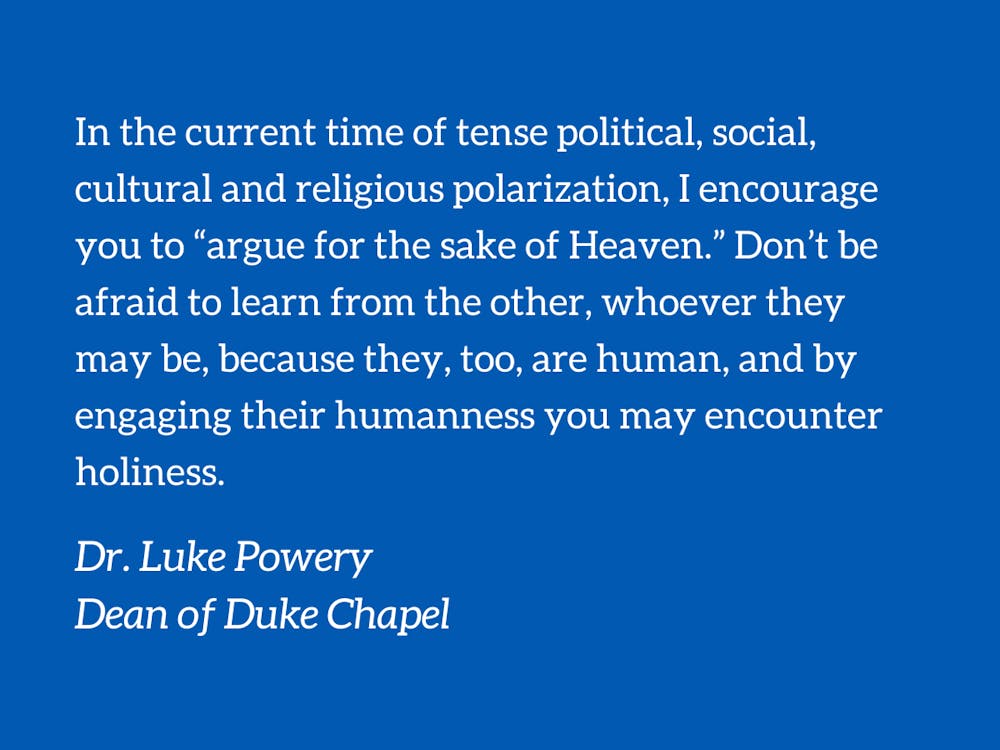As I reflect on last week’s Provost Forum focused on “Universities and the Israel-Palestine Conflict: How to Discuss, How to Engage?” and enter this week of the Centennial Founders’ and Homecoming celebrations, I am reminded of the founding of Duke University in 1924, including our institution’s guiding documents. “Article I: Aims” of the university bylaws speaks of how Duke “is committed to creating a rigorous scholarly community characterized by generous hospitality toward diverse religious and cultural traditions” and strives “to promote a respectful spirit of dialogue and understanding; to discourage all partisan and sectarian strife….” How relevant are these aims for the time in which we live!
The panel of Duke faculty and staff, for which I served as moderator, discussed the topic “dialogue and discourse amidst differences.” The panelists were the embodiment of Duke’s aims as a teaching and learning community. They were respectful, thoughtful, insightful and dialogical, while possessing a sense of intellectual humility and desire for further understanding. It revealed that discussions do not have to demonize but rather it is possible to engage in humanizing discourse. It was fitting that this panel occurred during the Centennial year because it demonstrated what Duke aims to be as an institution. I walked away inspired to continue in this “spirit of dialogue and understanding.”
Beyond the institutional, there is something theological about dialogue as well. In the Gospel of Luke, chapter 24, two disciples of Jesus, as they walk to the village Emmaus, are distraught over the death of Jesus and his body having gone missing from the tomb. They’re questioning, wondering, and uncertain, but they are in dialogue. They don’t understand what has happened and are grappling with those realities and their implications. It’s helpful to notice that as they engage in dialogue, that is when the resurrected Jesus appears among them. The ancient scripture says, “While they were talking and discussing, Jesus himself came near….” In genuine open dialogue and conversation, the Divine can manifest. Dialogue is not only a sociological phenomenon; it is a spiritual one. Conversation can be an invocation for the Holy.
There is a similar concept in Judaism that I learned about from my colleague Rabbi Elana Friedman during the recent panel discussion. It is called “argument for the sake of Heaven.” The gist of it is that people can debate for destructive purposes such as gaining power or humiliating an adversary or for good purposes, such as to better understand what is true or right — that is, for the sake of Heaven. The late English Chief Rabbi Jonathan Sacks explains, “‘Argument for the sake of Heaven’ is one of Judaism’s noblest ideals – conflict resolution by honouring both sides and employing humility in the pursuit of truth.”
In the current time of tense political, social, cultural and religious polarization, I encourage you to “argue for the sake of Heaven.” Don’t be afraid to learn from the other, whoever they may be, because they, too, are human, and by engaging their humanness you may encounter holiness.
During the COVID pandemic, I wrote a poem called “Space”:
Pandemics.
Social
Distance.
We are far away
From each other
Yet
Launch into space
Far away
At distance.
Closer to technology
Than one another.
Technology
Outpacing
Our humanity.
Get The Chronicle straight to your inbox
Sign up for our weekly newsletter. Cancel at any time.
We like distances.
Far away ones.
Go to space and
Not make space
For each other.
This is
Pandemonium.
It is truly pandemonium — a word reserved for the name of the capital of hell in John Milton’s epic poem "Paradise Lost" — when we eschew, ignore or hate other human beings and are unwilling to dialogue. To avoid pandemonium, why not embrace Duke’s bylaws and live into the “spirit of dialogue and understanding” and “discourage all partisan and sectarian strife”? This is a part of Duke’s culture that challenges us to not only “go to space” but to “make space for each other.” What the bylaws don’t say but I will, is that when we make space for one another in dialogue, we may be pleasantly surprised that we are also making space for God.
The Rev. Dr. Luke A. Powery is Dean of Duke University Chapel. His column runs on alternate Mondays.

